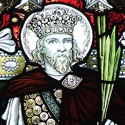|
Lord Tywin posted:Well this is more of a disadvantage but Gustavus Adolphus who changed the course of the 30-years war died because he was a fat gently caress, when he lay wounded on the battlefield at Lützen he was simply shoot in the head instead of being taken as a captive since he was too heavy.Furthermore the reason that he was so separated from his troops was also because he led a cavalry charge right into heavy fog while being myopic. He wasn't that fat, certainly not remarkably so for being a wealthy man at that period of time, or he wouldn't have been able to ride a horse into battle. Considering the enormous gain in taking him captive (certainly much more so than simply killing him), it seems very likely that he was killed by soldiers who didn't realize who he was. He was separated from his troops because, after taking command of a cavalry unit, he was wounded and forced to fall back, accompanied by his entourage. While trying to find their way back in the thick fog they became lost and encountered an enemy cavalry unit. The king's party was quickly overwhelmed and he was killed.
|
|
|
|

|
| # ? May 10, 2024 04:34 |
|
Not My Leg posted:This is absolutely true, and I didn't mean to make it sound like I was minimizing his accomplishments as Emperor. Plenty of people would have been killed or deposed much earlier in their reign, and plenty would have failed to ever make it to Emperor at all. It's just interesting that he was skilled, incredibly long lived, and he was first. You might have expected a few more false starts along the way before things either settled down or collapsed. Augustus actually establishes a dynasty.
|
|
|
|
I guess the partnership between Thutmose III and Hatshepsut during their time as co-pharaohs was reasonably effective, given that Thutmose III didn't have Hatshepsut declared damnatio memoriae and erased from history until she'd been dead for decades, as opposed to having her assassinated or whatever because he was totally super steamed about her being king.
|
|
|
|
Not My Leg posted:This is absolutely true, and I didn't mean to make it sound like I was minimizing his accomplishments as Emperor. Plenty of people would have been killed or deposed much earlier in their reign, and plenty would have failed to ever make it to Emperor at all. It's just interesting that he was skilled, incredibly long lived, and he was first. You might have expected a few more false starts along the way before things either settled down or collapsed. It's a gray area, since the Principate wasn't a monolithic office. It was a whole package of special powers and honors that Augustus collected piecemeal. Each of them had been held by powerful men in the late Republic (in 52 BC Pompey Magnus had the title of Princeps and was the sole Consul for the year), Augustus just brought all the powers, titles, and honors together.
|
|
|
|
Right. Augustus had everything a princeps would have in his titles and powers, and there was no republican restoration after him. But it's all convention. If you want to define emperor as one guy is in charge (not counting dictator) you could say Rome had seven and then a really long interregnum. The entire concept of emperor is itself a later invention remember, the Romans didn't have it at the time. I don't know when the title emerges. Emperor comes from imperator, which meant conquering general and wasn't used the same way. It is an official title for the princeps but not emperor like we think. In the east they use basileus, which is the Greek word for it. I guess when basileus becomes the official title of the emperor you could call that the first time emperor is being used. Or you could use it with Diocletian and the use of dominus instead of princeps. The princeps isn't just a single office. To use an American comparison, it wouldn't be Emperor Obama, it'd be like if Obama were President, VP, Speaker of the House, Chief Justice of the Supreme Court, and General of the Armies at the same time. Grand Fromage fucked around with this message at 04:29 on Jan 5, 2013 |
|
|
|
I want to know if there are any important events that for a long time were part of historical record but later proved to have not happened. Kind of like if someone discovered that Caesar wasn't assassinated but died peacefully in his bed, which would cast doubt and confusion on everything we believe to have followed. What unveilings along those lines have significantly changed our perspective on a particular point in ancient history?
|
|
|
|
Grand Fromage posted:Right. Augustus had everything a princeps would have in his titles and powers, and there was no republican restoration after him. But it's all convention. If you want to define emperor as one guy is in charge (not counting dictator) you could say Rome had seven and then a really long interregnum. Did calling them the princeps actually fool anybody? Particularly just the masses; would they have thought that it really was just the Republic as usual (if they cared at all) or were they well aware times had changed? ... actually on that, how much of an effect did the change to concentrated power actually have? Had Rome remained a republic for the rest of its history, would it have likely had the same achievements as it did under an Emperor?
|
|
|
|
Big Willy Style posted:It kinda sucks that Agrippa is made out to be a bit of a weiner in the HBO Rome series.
|
|
|
|
The goofball who nebbishly won Augustus' empire for him, made Rome a glorious city, and fathered half the Julio-Claudian dynasty.
|
|
|
|
Koramei posted:Did calling them the princeps actually fool anybody? Particularly just the masses; would they have thought that it really was just the Republic as usual (if they cared at all) or were they well aware times had changed? The key part of the Republic was to not have a king, not to exercise an authentically republican form of government. That's also why they refused to give the "emperor" a single title for so long - accruing 5000 offices instead let people sleep easier at night than if one new one had been created with the same powers.
|
|
|
|
Grand Fromage posted:Right. Augustus had everything a princeps would have in his titles and powers, and there was no republican restoration after him. But it's all convention. If you want to define emperor as one guy is in charge (not counting dictator) you could say Rome had seven and then a really long interregnum. So (and apologies if you said this and I missed it) how would a citizen refer to someone like Augustus (or indeed caesar himself)? Would it be a title similar to president x?
|
|
|
|
EvilHawk posted:So (and apologies if you said this and I missed it) how would a citizen refer to someone like Augustus (or indeed caesar himself)? Would it be a title similar to president x? They'd refer to both of them as "Caesar". "Imperator" was traditionally a military honorific. As time went on, it gained a greater sense of importance and usage became reserved for the emperor himself.
|
|
|
|
Koramei posted:Did calling them the princeps actually fool anybody? Particularly just the masses; would they have thought that it really was just the Republic as usual (if they cared at all) or were they well aware times had changed? It's always difficult to tell what the masses were thinking, because whatever ordinary Romans wrote down about such things hasn't survived. My guess is that it would gradually have become apparent to everybody that this was more than just another dictator like Sulla because of the sheer concentration of power in one man's hands and because it became obvious that Augustus intended this to continue after his death. Most of them were probably just glad to see the end of civil wars and the restoration of order. Rome was never truly a democracy, so it wasn't as if the ordinary citizen was really losing much in terms of political rights through one man rule. In effect, the aristocrats in the Senate had been calling the shots in politics for a long time. quote:... actually on that, how much of an effect did the change to concentrated power actually have? Had Rome remained a republic for the rest of its history, would it have likely had the same achievements as it did under an Emperor? They acquired most of the Empire under the Republic. It's a moot point whether they could have hung on to it with constant political instability and infighting, which is what the Republic had become by the time it ended.
|
|
|
|
Grand Fromage posted:use an American comparison, it wouldn't be Emperor Obama, it'd be like if Obama were President, VP, Speaker of the House, Chief Justice of the Supreme Court, and General of the Armies at the same time. And also the richest man in America by a huge margin.
|
|
|
|
euphronius posted:And also the richest man in America by a huge margin. Someone post this on Freep, see what the reactions are
|
|
|
|
Was there a distinction between the state treasury and the emperor's personal holdings? I would think there must have been since Octavian inherited a bunch of money, and there would have been a Republican treasury at that time. By the late empire though, this distinction may not have been as relevant.
|
|
|
|
What was roman pornography like? I recall hearing that pornography has basically existed in some form since man could draw. Was there some equivalent of a dirty magazine?
|
|
|
|
Not My Leg posted:How much of the final death of the Roman Republic and its permanent replacement with the Roman Empire can be attributed to the fact that the first emperor, Augustus, simply ruled for a really long loving time. I know that the Republic was in disarray for a long time before Augustus, as far back as Marius there are probably clear signs it wouldn't last, but at the same time, there was reason to believe it would not simply collapse forever and be replaced. It is reasonable to think that Rome would go through repeated periods of: Emperor dies/is murdered by Republicans - some form of Republic is formed - general gets cocky - civil war - general becomes Emperor - repeat. Had this happened, it is possible that the constant instability and infighting would have led to the relatively rapid collapse of Rome (or at least withdrawal to the Western Med/Italy).
|
|
|
|
Doctor Tupac posted:What was roman pornography like? I recall hearing that pornography has basically existed in some form since man could draw. Was there some equivalent of a dirty magazine? Part way through his reign, Tiberius took up more or less permanent residence on the island of Capri, and among the things he took with him were the books of Elephantisis, which I think was basically a collection of ancient Egyptian porn. I assume it was a bit like the Kama Sutra, but I don't think we have details beyond that the Roman historians thought it was some I suppose you could also include under this heading the famous wall paintings of couples in various sexual positions in one of the buildings in Pompeii, which I think may already have been posted in the thread. So there was erotic art and writing, but not really commerical pornography in the modern sense, because of social disapproval and also because most people who were literate had a sexual outlet anyway. Everyone married as soon as they could, there was a lot of prostitution and wealthy men who owned slaves sometimes had female slaves as mistresses in the same way that plantation owners in the American South sometimes did.
|
|
|
|
How common were brothels? Did every neighborhood have a brothel were regular workers could buy sex or was it only something for more affluent people?
|
|
|
|
Lord Tywin posted:How common were brothels? Did every neighborhood have a brothel were regular workers could buy sex or was it only something for more affluent people? Go look up the Pompeii graffiti. At least a few of them were of the 'for a good time,
|
|
|
|
I saw a tv doc once that showed a triangle of curlies carved into the sidewalk stone in a Roman ruin that was supposedly an ad or sign for a brothel. No need to know Latin, Greek or even read to understand that.
|
|
|
|
Best as I can tell most of the "brothel sign" things are bullshit. That was probably a magic protection sign, they're usually found at every crossroads. Erect dicks are a common form of that, which I think is where the brothel sign myth comes from. The Romans definitely had advertising/signage everywhere but brothels have created a lot of mythology around themselves. Prostitution in Rome wasn't that much different than it is now. It was legal and didn't have the Christian baggage loading it down, but the Romans had their own forms of prudery.
|
|
|
|
Not My Leg posted:This is absolutely true, and I didn't mean to make it sound like I was minimizing his accomplishments as Emperor. Plenty of people would have been killed or deposed much earlier in their reign, and plenty would have failed to ever make it to Emperor at all. It's just interesting that he was skilled, incredibly long lived, and he was first. You might have expected a few more false starts along the way before things either settled down or collapsed. Augustus is the first Emperor because he codified the position. The titles he took and the title's he kept became the most important parts of his power beyond anything else. Which is why later Emperors always took the same titles. One of the reasons Augustus was able to rise to power was the fact he was Caesar's heir (which made him the richest man in Rome), and bound the legions to him in a way it wouldn't have for anyone else but Anthony in his person as protector of Cleopatra and Caesarion who could have been the only challenger to Caesar's legacy.
|
|
|
|
Augustus smartly eased himself into empery with his series of name and title changes, didn't he? When Caesar adopted him, he changed his name to some variation of Julius Caesar, and when Caesar was deified, he added Divi Filius to his name. Even after he effectively became sole ruler of Rome, he was calling himself "First Citizen" for quite a while, if I'm not mistaken.
|
|
|
|
Halloween Jack posted:Augustus smartly eased himself into empery with his series of name and title changes, didn't he? When Caesar adopted him, he changed his name to some variation of Julius Caesar, and when Caesar was deified, he added Divi Filius to his name. Even after he effectively became sole ruler of Rome, he was calling himself "First Citizen" for quite a while, if I'm not mistaken. "First citizen" is the literal translation of Princeps isn't it? That title would last all the way until Diocletian, although any symbolic meaning behind it had obviously been lost by that point.
|
|
|
|
achillesforever6 posted:What was the reason that ended again? Wasn't it the church didn't want to lose property if the sons of Priests/Popes/Bishops would inherit the property and not the Church? The argument is that priests should be focused on building their community, not their dynasty. In many diocese you had absentee Bishops who were more interested in increasing the size and power of their estate than providing for the community. It was believed that sexually active clergy members would breed corruption and try to make Church positions hereditary. The Western Church decides early on that sexually active clergy is a bad thing. The Councils of Elvira and Carthage explicitly declare celibacy to be a necessary requirement for all priests and bishops. These decisions are supplemented by the writings of Pope Sicarius, who abandoned his wife and child to get elected, and Pope Saint Leo I. Even Emperor Justinian I gets involved and declares the offspring of all clergy to be bastards. The problem is the Papacy has no way to enforce the requirement. For every Pope who follows the obligation, there is another who ignores it. There is little pressure within the rank and file clergy to change. This changes with the Gregorian Reforms around 1050, which came about because of Saeculum obscurum. The Papacy had always been deeply involved with the Roman nobility. However, around 900 became a de facto hereditary position controlled by the descendents of the Duke of Tusculum. The few Popes not descended from the Duke were handpicked by him or his successors. It's difficult to exaggerate just how corrupt these officials were. For example, Pope Benedict IX was installed by his father around the age of 18 (or 12 depending on your source), goes on a murder rampage, sells the Papacy to his godfather, comes back a few months later with an army and reinstall himself as Pope causing a three-way Papal Schism. By his death Benedict IX was elected, ejected, returned, abdicated, deposed, returned again, ejected again, and excommunicated twice. It is an immensely embarrassing period for the Catholic Church. When Pope Gregory comes to power he resolves to prevent such an incident from ever happening again. In 1074 he publishes an encyclical, removing every single married priest, bishop, and cardinal from their position. This resulted in massive unrest within the Church and many clergy members actively revolt against the Pope. In response, Gregory issues an edict inviting the people to rise up and violently seize the property of any non-celibate bishop. This occurs in several places and forces the clergy to at least pay lip service to the notion of celibacy. The First and Second Lateran Councils put the last nail in the coffin and end the acceptance of married priests within the Catholic Church. These councils had widespread lay support and made it difficult for any clergy member to voice opposition without risking the loss of his position and lands. QuoProQuid fucked around with this message at 20:20 on Jan 7, 2013 |
|
|
|
QuoProQuid posted:The argument is that priests should be focused on building their community, not their dynasty. In many diocese you had absentee Bishops who were more interested in increasing the size and power of their estate than providing for the community. It was believed that sexually active clergy members would breed corruption and try to make Church positions hereditary. None of these reforms stopped the "Cardinal Nephew" position from forming, which was often the sons of Popes. Honestly the lack of married clergy more then likely hurt the Church in the long run as it created two classes of clergy (the poor local and the rich senior). There are a number of examples of local clergy being unable to feed themselves from English sources in the 11th and 12th century. The Papacy has an insanely interested political history that's really hard to map properly.
|
|
|
|
That's where we get "nepotism" by the way. Nepo -> Nephew.
|
|
|
|
sbaldrick posted:None of these reforms stopped the "Cardinal Nephew" position from forming, which was often the sons of Popes. Honestly the lack of married clergy more then likely hurt the Church in the long run as it created two classes of clergy (the poor local and the rich senior). There are a number of examples of local clergy being unable to feed themselves from English sources in the 11th and 12th century. Exactly. The reforms above ended up creating a whole slew of other problems. I was just trying to answer where the non-married and celibate requirements for priesthood came from. There was plenty of abuse that still occurred, and plenty of Popes who could not keep it in their robes, but it became much less accepted. QuoProQuid fucked around with this message at 22:01 on Jan 8, 2013 |
|
|
|
Surely someone making his nephew a Cardinal is less of a danger than making his own son a Cardinal. It might not have solved the problem, but I imagine it would have ameliorated it.
|
|
|
|
AgentF posted:Surely someone making his nephew a Cardinal is less of a danger than making his own son a Cardinal. It might not have solved the problem, but I imagine it would have ameliorated it. Sometimes the nephew was really the son
|
|
|
|
Grand Fromage posted:Best as I can tell most of the "brothel sign" things are bullshit. That was probably a magic protection sign, they're usually found at every crossroads. Erect dicks are a common form of that, which I think is where the brothel sign myth comes from. This made me wonder - why are the dick statues called herms, as in Hermes? And hermaphrodite, come to think of it. Why was Hermes/Mercury associated with masculinity more than Ares, Zeus, or someone a bit manlier?
|
|
|
|
House Louse posted:This made me wonder - why are the dick statues called herms, as in Hermes? And hermaphrodite, come to think of it. Why was Hermes/Mercury associated with masculinity more than Ares, Zeus, or someone a bit manlier? 'Herm' is just short for hermaphrodite, which in turn is Hermes and Aphrodite combined. And vaguely related, Jupiter is from 'Zeus Pater' (Father Zeus) if you ever wondered. I know I did and I sleep easier now.
|
|
|
|
Mr Havafap posted:'Herm' is just short for hermaphrodite, which in turn is Hermes and Aphrodite combined. Yeah, but he's wondering why it's Hermes' name that's used to indicate the male half of hermaphrodite rather some more "manly" guy like Zeus or Ares. According to Robert Graves it's because Hermaphroditus was the result of a quick fling between Aphrodite and Hermes.
|
|
|
|
Golden_Zucchini posted:Yeah, but he's wondering why it's Hermes' name that's used to indicate the male half of hermaphrodite rather some more "manly" guy like Zeus or Ares. According to Robert Graves it's because Hermaphroditus was the result of a quick fling between Aphrodite and Hermes. Hermahroditus was the child of hermes and aphridite, so he is called after his parents, it's pretty evident. Also about Ares, he was not a popular god, like at all. He represents the savage nature of warfare, his (most important) children are Phobos and Deimos, Fear and Terror. Compare this to Athene (maybe the most popular god), who represents intelligence, and because of that also tactics and strategy in battle, and is often depicted with Nike (Victory). In the Iliad Ares was on the losing side, while Athena was on the winning side.
|
|
|
|
Never mind I got it wrong.
|
|
|
|
Ares is also (IMO) the best example of how the Greek and Roman pantheons are different, we talked about it somewhere earlier in the thread. Ares and Mars are both gods of war but not at all equivalents in character or how the culture treats them. I had no idea hermaphrodite came from Hermes and Aphrodite, though it is incredibly obvious now.
|
|
|
|
Golden_Zucchini posted:Yeah, but he's wondering why it's Hermes' name that's used to indicate the male half of hermaphrodite rather some more "manly" guy like Zeus or Ares. According to Robert Graves it's because Hermaphroditus was the result of a quick fling between Aphrodite and Hermes. Yeah - what aspects of Hermes' myth made people tell the story of him bonking Aphrodite and having a hermaphrodite child? I thought the herms were named for him directly because he protected travellers and merchants.
|
|
|
|

|
| # ? May 10, 2024 04:34 |
|
House Louse posted:Yeah - what aspects of Hermes' myth made people tell the story of him bonking Aphrodite and having a hermaphrodite child? I thought the herms were named for him directly because he protected travellers and merchants. It was more of a side effect of Aphrodite's myth. Aphrodite was married to Hephaestus and rather unhappy since he was so ugly. She started sleeping around with other guys, Ares in particular, and Hephaestus caught wind of it. Hephaestus then decided to catch them at it by pretending to go on a trip, then snared Ares and Aphrodite in a bronze net. Once they were caught, Hephaestus summoned all the other gods there to witness their (and his) shame. Apollo made a comment to Hermes to the effect of "Embarrassing but worth it, huh?" Hermes responded with an emphatic yes, and once the whole thing was settled Aphrodite, never one to learn from her mistakes, rewarded Hermes for his enthusiasm with a night all to themselves. Hermaphroditus was the result. As I look further I see that Hermes was also a fertility god early in his career, which would explain his connection with the phallus and why there were an important part of herms, which was indeed named for him as god of travelers and crossroads. That might also explain why he was chosen as the father of Hermaphrodite: I can see male fertility god and female sex/reproduction goddess combining to make a being that is fertile unto itself. That's pure speculation, though.
|
|
|




























